八下unit2导学案
新外研版八年级英语下册导学案Module 2-Experiences(Unit1-Unit3)
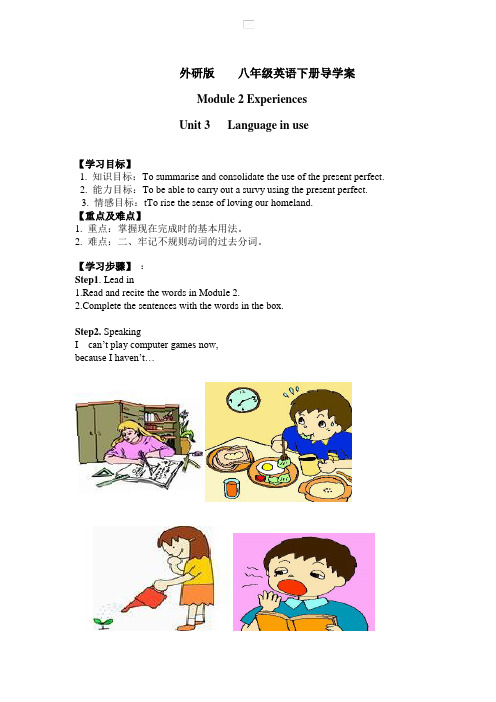
外研版八年级英语下册导学案Module 2 ExperiencesUnit 3 Language in use【学习目标】1. 知识目标:To summarise and consolidate the use of the present perfect.2. 能力目标:To be able to carry out a survy using the present perfect.3. 情感目标:tTo rise the sense of loving our homeland.【重点及难点】1. 重点:掌握现在完成时的基本用法。
2. 难点:二、牢记不规则动词的过去分词。
【学习步骤】:Step1. Lead in1.Read and recite the words in Module2.plete the sentences with the words in the box.Step2. SpeakingI can’t play computer games now,because I haven’t…Step3. Write a questionnaire about your experiences.Have you ever …had a Western meal?lived in another city?entered a singing competition?travelled by train?travelled to the seaside?tried seafood?cooked dinner for your parents?------Yes, I have. / No, I haven’t.Step4 Complete the sentences.1. He/She _____________________ a Western meal.2.He/She ______________________ in another city.3.He/She ______________________ a singing competition.4. He/She _____________________ by train.5.He/She ______________________ the seaside.6.He/She ______________________ seafood.7.He/She ______________________ for his/her parents.Step5. Complete the postcard. Use the list of Things to do in China to help you.Things to do in China!------go to Beijing,see the Beijing Opera,climb the Great Wall,eat Beijing duck,visit the Palace MuseumStep6 Activity4Dear David,I’m having a wonderful time in China. I’ve done so many things!I’ve__________________________________________________________________________________ ___________________________________________________________ There’s only one thing I haven’t don e :I...______________________________________Bye for now,RobStep7. Complete the sentences with the words in the box.afford, competition, pronounce, spell, tower1.I wrote a story for a(n) ___________ in my English class and I won a prize.2.Alice can _______ very well, and what's more, she can write beautifully.3.Some English words are difficult to ____________.4.We visited an ancient palace with a tall_______ and a beautiful garden.5.Mary wants to visit the US, but the plane tickets are very expensive and she cannot ______ to go.Step8.Listen and check (√) the correct answer.Places visitedPeople China Europe USAWinnieDianaBobStep9. Listen again and answer the questions.1. ( ) How many times has Winnie been to the US?A. two timesB. three timesC. four times2. ( ) Where would Diana like to go again?A. the USB. EnglandC. China3. ( ) Which part of China has Diana travelled around?A. NorthB. SouthC. West4. ( ) How did Diana travel there?A. by boatB. by trainC. by plane5. ( ) Has Bob ever visited Germany?A. No, he hasn’tB. Yes, he has【知识结构】(一)、Grammar现在完成时如果你想说“我已经看过某部电影,所以不想看了” “某人曾经做过什么事情”等等,该如何表达呢?首先请看下面的句子:(1)I have seen the f ilm. I don’t want to see it again.(2) Have you ever read a travel brochure?(3) I have never visited the USA.以上句子的谓语动词有一个共同的特点就是“have/has+动词的过去分词”, 用于表示在以前的某个时间曾经做过的、发生的事情,这种行为对目前有某种影响,如(1); 还可以表示到目前为止曾经经历或没经历的事情,如(2)(3)。
Unit2BRIDGINGCULTURESReadingandThinking(导学案)
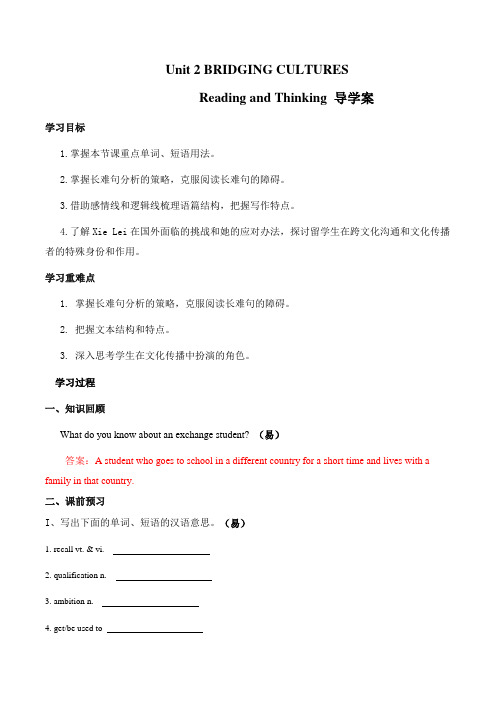
Unit 2 BRIDGING CULTURESReading and Thinking 导学案学习目标1.掌握本节课重点单词、短语用法。
2.掌握长难句分析的策略,克服阅读长难句的障碍。
3.借助感情线和逻辑线梳理语篇结构,把握写作特点。
4.了解Xie Lei在国外面临的挑战和她的应对办法,探讨留学生在跨文化沟通和文化传播者的特殊身份和作用。
学习重难点1. 掌握长难句分析的策略,克服阅读长难句的障碍。
2. 把握文本结构和特点。
3. 深入思考学生在文化传播中扮演的角色。
学习过程一、知识回顾What do you know about an exchange student? (易)答案:A student who goes to school in a different country for a short time and lives with a family in that country.二、课前预习I、写出下面的单词、短语的汉语意思。
(易)1. recall vt. & vi.2. qualification n.3. ambition n.4. get/be used to5. adaptation n.6. fort vt. &n.①vt.②n.7. take turns to do sth.8. participation n.答案:1.记起;回想起;使想起;召回2. (通过考试或学习课程取得的)资格;学历3. 追求的目标;夙愿;野心;抱负4. 习惯于做某事5. 适应;改编本6. ①安慰;抚慰②安慰;令人感到安慰的人或事物;舒服;安逸7. 轮流做某事8. 参加;参与II、自主预习与检测。
(易)1. qualification词性:____________ 意思:_____________acquire/gain/get/obtain/have/hold qualifications获得/取得/得到/拿到/拥有/持有资格a qualification for对……的条件qualify vt.& vi.(使)具备资格;(使)合格qualify for有资格……be qualified for胜任……,适合……练习:He's been informed that he doesn't qualify _________ the scholarship because of his academic background.他被告知,因为其学术背景,他没有资格获得这笔奖金。
人教版英语八年级下册导学案

Unit4Section A一、学习目标:1) Important words: mad, anymore, message, suppose, hard-working2) Important phrases: watch soap operas, be supposed to do, first of all, pass on, sth. happen on …3) Important Sentences①She said she was mad at Marcia. ②She said she was having a party for Lana.③What happened on “Young Lives” last night? ④You are supposed to meet at the bus stop to return it.4) Grammar: 直接引语和间接引语二、学法指导:运用任务型学习,驱动学生掌握直接引语与间接引语之间的转化三、学习过程:Step1自学单元语法:(直接引语和间接引语)(一) 直接引语和间接引语的含义:引述别人的话时,一般采用两种形式:一是引用别人的原话,两边用引号标出,称为直接引语;二是用自己的语言转述别人的话,称为间接引语。
间接引语在句中实际上就是宾语从句。
(二) 直接引语变间接引语的方法:1.从句人称的变化:由直接引语变间接引语时,从句的主语人称要遵循一主、二宾、三不变的原则。
1)直接引语的主语是第一人称时,变为间接引语时要和主句的主语保持一致。
2)eg:①They said,“We will go there by bus”。
→They said they would go there by bus.3)②He said,“I am visiting my aunt next week.”→He said that he was visiting his aunt next week.2)如果直接引语的主语是第二人称,变为间接引语时要与主句的宾语保持一致。
八下英语导学案人教版答案

八下英语导学案人教版答案Unit 1Times are ChangingⅠ. go well with 2. meet up with 3. called on 4. fly up 5. on the wayⅡ. 1. What 2. How 3. How often 4. How many 5.Who/WhoeverⅢ.1-5D B C A E 6-10F J G I HⅣ. 1-5C E D B AⅤ. 1. on display 2. had better 3. brought back 4. to give away 5. to play withⅥ. 1. does; enjoy 2. Did; hear 3. doesn’t; talk 4. Did; travelⅦ. 1. take off 2. make a speech 3. show off 4. join in 5. run afterⅧ. 2. on display 3. ran after 4. is changing 5. saw offUnit 2Lessons from the PastⅢ.1-5B D F A C 6-10H G E K JⅣ.is known for; being 2. are proud of 3. were led by 4. have been; since 5. Often; surprisesⅤ. 1. according to 2. take up 3. so that 4. besides5. make upⅦ. 1. whether; or 2. neither; nor 3. both; and 4. not only; but alsoⅧ. | 不同凡舞的 | 经历; 在战争中; 为; 胜利; 而战Ⅸ. 1. fought against 2. besides 3. both; and 4. neither; nor 5. Not only; but alsoUnit 3CommunicationⅡ. 1. How tall 2. What kind of 3. How many;are there 4. What color 5. How muchⅢ.1-5A D E B C 6-10I G H F JⅤ. 1. by;living 2. by; learning 3. It; possible; get 4. as; possible 5. after; goingⅥ. 1. was trying; failed 2. were chatting 3. makes; laugh 4. doesn’t; writeⅦ. 1. starts up 2. looked up to 3. turn down 4. come up with 5. looking forⅧ. 1. are chatting 2. gives up 3. looked up 4. come up withUnit 4Wildlife ProtectionⅠ. 1. put off 2. came up with 3. sign up (for) 4. make up 5. work outⅡ. 1. 和 . . . . . . 在一起; 2. 拥抱自然; 3. 在未来; 4. 长至; 5. 产生危险Ⅲ. 2. separated; from 1. grow up 3. protecting; from 4. welcomed; into 5. inspired; withⅣ. 1-5D E C A BⅤ. 1. to give up 2. taking care of 3. to make up 4. give away 5. bringing backⅥ. 1. asked; to follow; refused 2. is planning ; will start 3. was told ; not to go 4. wanted; to go, toldⅦ. 1. make up 2. looking after 3. go over 4. take care of 5. give awayⅧ. 2. took care of 3. give up 4. looked afterUnit 5FilmsⅢ. 1-5A B C D FⅣ. 1. are enjoyed by 2. as; as 3. The more; the more 4. would rather; than 5. So; thatⅤ. 1. are; taken 2. is being; looked 3. is used 4. to entertain 5. to makeⅥ. 1. were being watched 2. enjoy;playing 3. are; taught / have; taught 4. is known; meanⅦ. 1. turned down 2. made up 3. take off 4. keep on 5. went offⅧ. 1. are being taught 2. turned up 3. makes upUnit 6I'm watching TVⅡ. 1. How long 2. How often 3. How many; did 4. How much; isⅢ.1-5B A E C D 6-10G F J H IⅣ.1-5C B A E DⅤ. 1. in trouble 2. get; a sunbath 3. flew away 4. to express; anger 5. for relaxing(笑)。
新外研版八年级英语下册导学案-Module 5 Cartoons(Unit1-Unit3)

外研版八年级英语下册导学案Module 5 CartoonsUnit 1 It’s time to watch a cartoon.一、学习目标:1.一般现在时、一般过去时和现在完成时的区别。
2.能听懂和阅读关于介绍卡通片的语言材料,能通过相关词汇和图片描述自己和他人的对卡通片的观点;能编写关于卡通片的对话。
3.学会倾听他人的对卡通片的看法;养成关心、帮助他人的良好品质;认识到动画片的悠久和灿烂。
二、重点及难点:三种时态的区分。
三、学习步骤:Step 1 Lead-in1. Ss watch the video and answer “What’s this cartoon about?”.2. Ss look the pictures and answer the questions.Do you know this cartoon?What’s the name of the cartoon?What do you think of the cartoon?Step 2 New wordsLook and say. The teacher shows the pictures of new words and let the students to say as quickly as possible.1. cartoon n.漫画;动画片2. handsome adj. 英俊的3. smart adj. 聪明的4. sky n. 天空5. cool adj. 酷的6. hero n. 英雄;男主角7. humorous adj. 幽默的8. laugh v. 笑9. lesson n.经验;教训Step 3 Answer the questions1.What kind of cartoons do you like?2.Do cartoons always end in a happy way?3.What cartoons do you think are funny?Step 4 Listening1. Listen to Part 2 and find out Betty’s and Tony’s answers to the questions in Activity 1.brave, cartoon, cute, funny, handsome, smart2. Now work in pairs and check. Do they like the same cartoons as you?3. Listen to Part 3 and answer the following questions.1) Wh at are Tony and Daming talking about?2) What does Daming think is better?Answers: 1. They are talking about cartoons.2. He thinks Superman is better.Step 5 Reading1.Now answer the questions.1. What does Tony think about Spiderman?2. Why does Daming think Superman is better?3. Why do they both like Tom and Jerry?4. What lesson can Tony learn from Tom and Jerry?Answers: 1. Spiderman can’t fly, but he climbs up buildings with his hands and feet. That’scool.2. Becaus e he’s stronger th an Spiderman. He can fly though the skyand fight badpeople.3. Because Tom and Jerry are very funny.4. They fight a lot, but t hey really love each other.Step 6 Everyday EnglishLet Ss say what they have learnt in the passage.Step 7 Language pointsSs should master the main points from the passage in Part 3.If possible, let the students to say at first.1. Do cartoons always end in a happy way? 卡通片常以快乐的方式结束吗?in a … way 表示“以一种…的方式”。
八年级英语下册全册导学案
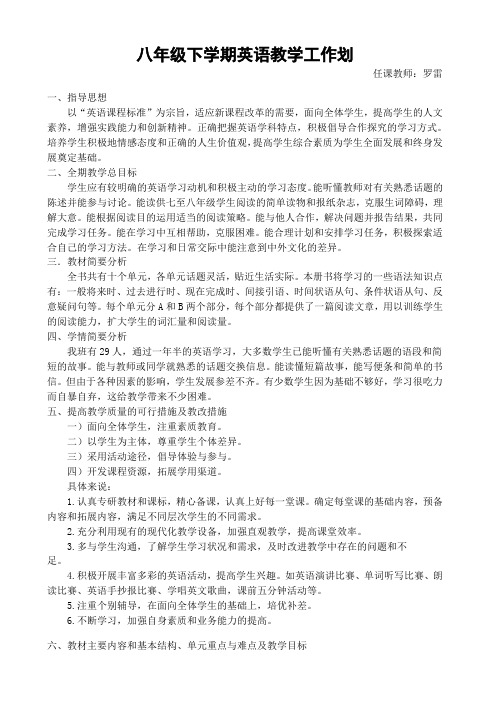
八年级下学期英语教学工作划任课教师:罗雷一、指导思想以“英语课程标准”为宗旨,适应新课程改革的需要,面向全体学生,提高学生的人文素养,增强实践能力和创新精神。
正确把握英语学科特点,积极倡导合作探究的学习方式。
培养学生积极地情感态度和正确的人生价值观,提高学生综合素质为学生全面发展和终身发展奠定基础。
二、全期教学总目标学生应有较明确的英语学习动机和积极主动的学习态度。
能听懂教师对有关熟悉话题的陈述并能参与讨论。
能读供七至八年级学生阅读的简单读物和报纸杂志,克服生词障碍,理解大意。
能根据阅读目的运用适当的阅读策略。
能与他人合作,解决问题并报告结果,共同完成学习任务。
能在学习中互相帮助,克服困难。
能合理计划和安排学习任务,积极探索适合自己的学习方法。
在学习和日常交际中能注意到中外文化的差异。
三.教材简要分析全书共有十个单元,各单元话题灵活,贴近生活实际。
本册书将学习的一些语法知识点有:一般将来时、过去进行时、现在完成时、间接引语、时间状语从句、条件状语从句、反意疑问句等。
每个单元分A和B两个部分,每个部分都提供了一篇阅读文章,用以训练学生的阅读能力,扩大学生的词汇量和阅读量。
四、学情简要分析我班有29人,通过一年半的英语学习,大多数学生已能听懂有关熟悉话题的语段和简短的故事。
能与教师或同学就熟悉的话题交换信息。
能读懂短篇故事,能写便条和简单的书信。
但由于各种因素的影响,学生发展参差不齐。
有少数学生因为基础不够好,学习很吃力而自暴自弃,这给教学带来不少困难。
五、提高教学质量的可行措施及教改措施一)面向全体学生,注重素质教育。
二)以学生为主体,尊重学生个体差异。
三)采用活动途径,倡导体验与参与。
四)开发课程资源,拓展学用渠道。
具体来说:1.认真专研教材和课标,精心备课,认真上好每一堂课。
确定每堂课的基础内容,预备内容和拓展内容,满足不同层次学生的不同需求。
2.充分利用现有的现代化教学设备,加强直观教学,提高课堂效率。
外研版英语八年级下册Module 2导学案(3节)
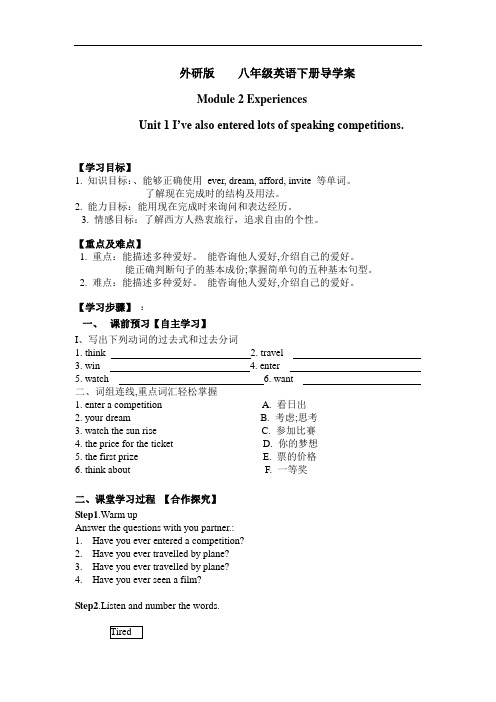
外研版八年级英语下册导学案Module 2 ExperiencesUnit 1 I’ve also entered lots of speaking competitions.【学习目标】1. 知识目标:、能够正确使用ever, dream, afford, invite 等单词。
了解现在完成时的结构及用法。
2. 能力目标:能用现在完成时来询问和表达经历。
3. 情感目标:了解西方人热衷旅行,追求自由的个性。
【重点及难点】1. 重点:能描述多种爱好。
能咨询他人爱好,介绍自己的爱好。
能正确判断句子的基本成份;掌握简单句的五种基本句型。
2. 难点:能描述多种爱好。
能咨询他人爱好,介绍自己的爱好。
【学习步骤】:一、课前预习【自主学习】I、写出下列动词的过去式和过去分词1. think2. travel3. win4. enter5. watch6. want二、词组连线,重点词汇轻松掌握1. enter a competition A. 看日出2. your dream B. 考虑;思考3. watch the sun rise C. 参加比赛4. the price for the ticket D. 你的梦想5. the first prize E. 票的价格6. think about F. 一等奖二、课堂学习过程【合作探究】Step1.Warm upAnswer the questions with you partner.:1. Have you ever entered a competition?2. Have you ever travelled by plane?3. Have you ever travelled by plane?4. Have you ever seen a film?Step2.Listen and number the words.1. Lingling has visited / hasn’t ever visited the US.2. Betty has asked / hasn’t asked her parents.3. Lingling has travelled / hasn’t travelled by plane.Step4. 读对话找出现在完成时的句子。
Unit 2 What time do you go to school 导学案(含答案)

❶ at作介词,无论表示时间点还是空间点,at都用于“小而具体”的名词前,比如时间表达“在几点”,地点表达“在哪儿”。
eg:at the moment此时此刻at nine o'clock在9点at noon在中午
❷ in的本意是“在……之内”,表示时间的时候,指的是在一个比较长的时间段之内,表示地点的时候,表示在地点名词内部。
【辨析】:work与job
work
不可数名词
泛指抽象意义的工作。
job
可数名词
指具体的某种工作或职业。
eg:My brother has a job(n. ). He is a worker(n. ) and works(v. ) in a factory. He likes his work(n. ) very much.我哥哥有一份工作。他是一名工人,在一家工厂工作。他非常喜欢他的工作。
7.because we have a shower schedule.
____________________________________________________________________
8.He works at a radio station.
____________________________________________________________________
5.What time do you usually take a shower, Rick?
____________________________________________________________________
8年级下册英语导学案Unit2

学校:班级:小组:姓名:小组评价:教师评价:Unit 2 I’ll help to clean up the city parks.第一课时 Section A(1a-1c)【学习目标】1.会使用重点单词cheer,volunteer...,重点短语clean up,cheer up,give out...2.会使用“I could...”、“I hope to...”等句型,向别人提供协助。
3.能听懂、能说出“协助他人,参加社会公益活动”的相关话题。
【学习重难点】1.掌握cheer,volunteer...,clean up,cheer up,give out...的用法。
2.用重要句型向别人提供协助。
【学法指导】1.查词汇表,自学本课时新词汇。
2.朗读1b,勾画有用的表达:clean up,cheer up,give out,at the food bank3.互助学习,练习对话。
【自学互助】一.温故知新:和同伴议一议,讨论回答以下问题。
1.Do you think helping other is great?2.What will you do if you are a volunteer? Please give some examples.二.翻译以下短语。
1.清扫__________2.分发___________3.使快乐;振奋____________________4.sick children________________5.at the food bank__________________6.after-school study program______________________三.通过互助学习后,我的疑惑是_____________________________________________________________________________ 【展示互导】看图说,仔细听,认真评通过观察1a图片中你能够协助人们的方式,然后列出更多其他方式。
Unit 2 Let’s go to the cinema on Friday 初中英语学案、导学案

Unit 2 Let’s go to the cinema on Friday.课型:读写课【学习目标】1、熟练掌握本课所学新词汇。
2、能读懂简单的广告类文体,并从中获取重要信息。
3、学会用电子邮件的方式向别人发出邀请;掌握时间地点的表达方式。
【课前准备】1、课前大声朗读下列新单词,注意其音标和汉意,将不会读的圈出来。
magic 魔术show 表演day 日子;白天place 地点price 价格theatre 剧院swimming 游泳come 来2、预习课文,找出下列短语太极拳班__________________ 在花园旅馆_______________在大连体育馆__________________ 魔术表演________________在新时代电影院_______________ 游泳课__________________乒乓球比赛_____________________ 最衷心的祝福_____________3、问题准备:把预习中的疑难问题记录下来。
________________________________________________________________________________________________________________________【课堂活动】Step1、新课导入:1、检查词汇预习,采用小组互查的形式,出现问题让学生及时改正。
2、复习听说课的内容,让学生描述如何发出邀请,提出建议。
然后在小组内练习,再全班交流3、由谈论邀请开始导入新课,最近什么时间什么地点有你感兴趣的节目或赛事?___________________________________________________________________________________________________________________________________ ___________________________________________Step2、泛读训练:1、学生独自阅读短文,了解大意,判断对错。
人教版新目标八年级英语第2单元Unit2教案
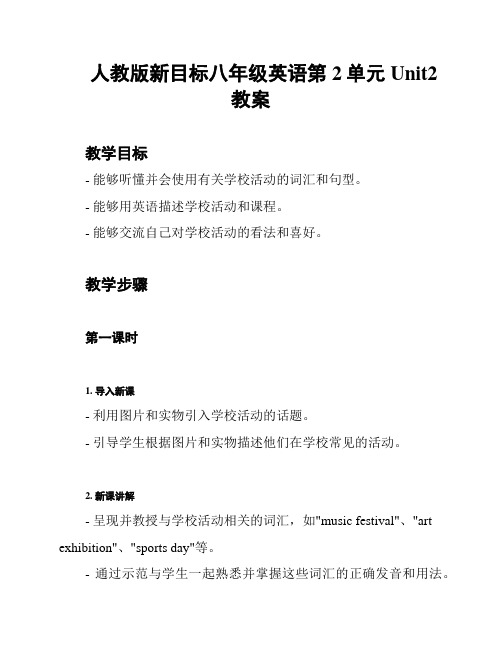
人教版新目标八年级英语第2单元Unit2教案教学目标- 能够听懂并会使用有关学校活动的词汇和句型。
- 能够用英语描述学校活动和课程。
- 能够交流自己对学校活动的看法和喜好。
教学步骤第一课时1. 导入新课- 利用图片和实物引入学校活动的话题。
- 引导学生根据图片和实物描述他们在学校常见的活动。
2. 新课讲解- 呈现并教授与学校活动相关的词汇,如"music festival"、"art exhibition"、"sports day"等。
- 通过示范与学生一起熟悉并掌握这些词汇的正确发音和用法。
- 操练这些词汇,并与学生一起编制句子来描述学校活动。
3. 听力训练- 播放关于学校活动的对话,要求学生仔细听并选择正确的图片。
- 学生互相对话,讨论听到的对话内容。
4. 对话练- 分组或两人一组,让学生模仿对话,表演关于学校活动的场景。
- 鼓励学生用英语进行自由对话,并互相分享自己参与过的学校活动。
5. 作业布置- 课堂分发作业卷,要求学生写一篇短文,介绍自己最喜欢的学校活动,并陈述原因。
第二课时1. 短文分享- 学生轮流与同桌分享自己写的短文。
- 鼓励其他学生提出问题或表达对短文的意见和建议。
2. 阅读训练- 学生阅读一篇关于学校活动的短文,并回答相关问题。
- 教师引导学生理解短文的内容,帮助他们解决阅读中遇到的问题。
3. 语法讲解- 教授句子结构"What do you think of + 学校活动?"和相应的答语。
- 帮助学生理解并掌握这种句子结构的用法。
4. 语法练- 学生分组或两人一组,互相提问"What do you think of + 学校活动?"并回答对方。
- 引导学生用所学词汇和句型互相交流和讨论自己对学校活动的看法和喜好。
5. 总结课堂内容- 教师带领学生回顾本节课所学的词汇、句型和语法。
译林版英语八下unit2复习导学案

8BUnit2复习导学案一、自主复习A。
词形变化1. beautiful adj. →________ (n.) 美人,美丽2. sail v. →________ (n.) 帆船运动3. fly v. →________ (n.) 航班4. die v. →________ (adj.) 死的5. direct adj. →________ (adv.)6. indoor adj. →________ (反义词)【即时自测1】.用括号内所给词的适当形式填空1. The plane has been on ________ (fly) for half an hour.2. The dog is found ________ (die) in the doorway of a fruit shop.3. Can you feel the ________ (beautiful) of the old parks in Beijing?4. Young people usually think ________ (travel) is exciting.5. Could you tell me the answer ________ (direct)?B.词组归纳---见讲义【中考指导书】---Page99--100二、考点精讲●考点1 speed n. 速度[点拨] at a speed of…以……的速度at top speed 以最高速He drove at sixty miles an hour.他以每小时60英里的速度开车。
[拓展] speed vt.& vi. 急行,加速,超速speed up 加速slow down 减速We'd better speed up if we want to get there on time.如果我们想准时到达那里,我们最好加快速度。
●考点2 beauty n. 美人,美丽beautiful adj. 美丽的,漂亮的;beautifully adv.美丽地,完美地,出色地,很好。
八年级英语(下册)导学案unit2.
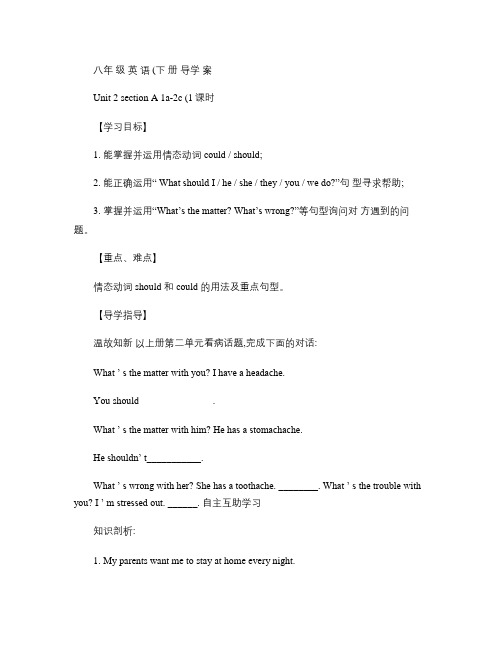
八年级英语 (下册导学案Unit 2 section A 1a-2c (1课时【学习目标】1. 能掌握并运用情态动词 could / should;2. 能正确运用“ What should I / he / she / they / you / we do?”句型寻求帮助;3. 掌握并运用“What’s the matter? What’s wrong?”等句型询问对方遇到的问题。
【重点、难点】情态动词 should 和 could 的用法及重点句型。
【导学指导】温故知新以上册第二单元看病话题,完成下面的对话:What ’ s the matter with you? I have a headache.You should_______________.What ’ s the matter with him? He has a stomachache.He shouldn’ t___________.What ’ s wrong with her? She has a toothache. ________. What ’ s the trouble wi th you? I ’ m stressed out. ______. 自主互助学习知识剖析:1. My parents want me to stay at home every night.want sb. to do sth 想要某人做某事2. My brother plays his CDs too loud.Loud, loudly, aloud均可作副词,表示“大声地”常与“ speak, talk, laugh ” ”等词连用。
1 loud 可用作形容词,有比较级、最高级;Could you speak a little louder? 你能稍微说大声点吗?2 loudly 通常表示有喧闹的意味,一般没有比较级和最高级;Everyone began to speak very loudly. 大家都开始大吵大闹。
部编版八年级下册语文第二单元导学案(含答案)

八年级语文下册备课提纲第二单元一、单元目标:1.在整体把握课文内容的基础上,品读文章的理趣和情趣。
2.了解文章介绍的科学知识,读懂文章说明的事理。
3.理清说明顺序,筛选主要信息,揣摩说明事理的语言特点。
德育目标:学习科学探究的方法,领悟科学精神,培养探索科学奥秘的兴趣和良好的思维习惯。
二、教材分析:草木枯荣,大雁来去,恐龙无处不有,沙子极为致密,这些现象背后都蕴含着一定的科学道理。
本单元的课文都是阐释事理的说明文,涉及物候学、地质学、生态学等领域,体现了求真、严谨的科学精神。
《大自然的语言》把一门科学——物候学介绍的浅显易懂,饶有趣味。
《阿西莫夫短文两篇》有力地证明了“不同科学领域之间是紧密相连的,在一个科学领域的新发现肯定会对其他领域产生影响”的道理。
《大燕归来》抒发对大雁的喜爱之情。
《时间的脚印》是一篇富有科普情趣的说明文,文章启示人们应该珍惜时间,并用自己的知识和智慧去读懂大自然的记录,造福人类。
三、教学重点及难点:学习这个单元,要注意理清文章的说明顺序,筛选主要信息,读懂文章阐释的事理;还要学会分析推理的基本方法,善于发现问题、思考问题、质疑问难,激发科学探究的兴趣。
阅读这些课文,可以培养注重观察、讲究实证的科学态度,讲究科学创新的精神,还可以学习正确的科学方法。
阅读中要学会默读,并有一定的速度,能按要求筛选信息。
四、学情分析:经过半个学期的学习,学生的语文基础又有了提升。
本单元的教学内容是阐释事理的说明问,涉及物候学、地质学、生态学等领域,体现了求真、严谨的科学精神。
学生在此之前已经学习过了说明文,但是对这类事理性的接触较少。
学习这个单元,要在理清文章的说明顺序的基础上,筛选主要信息,读懂文章阐释的事理;还要学会分析推理的基本方法,善于发现问题、思考问题、质疑问难,激发科学探究的兴趣。
五、教学课时安排第五课一课时第六课两课时第七课一课时第八课一课时六、写作:《说明的顺序》(一)学习目标1、说明顺序有时间顺序、空间顺序和逻辑顺序。
新外研版八年级英语下册导学案Module 1(Unit 1~Unit 3)

外研版 八年级英语下册导学案Module 1 Feelings and impressionsUnit 1 It smells delicious.【学习目标】1. 知识目标:能够正确运用表示感觉和知觉的系动词,并且识记本单元的单词、重点短语: Smell, soft, sour, lovely, try, have a try, sound, salt,favourite 等等。
2. 能力目标:能够听懂本单元中表示感觉和知觉的系动词(sound, smell, look,taste, feel)表述的内容并能与图片匹配。
3. 情感目标:通过学习表达对事物的感觉能够更好地理解别人,从而更懂得关爱别人。
【重点及难点】1. 重点:掌握句子的系表结构:linking verb+adj. (系动词+形容词)。
2. 难点:运用表示感觉和知觉的系动词表达对事物的感觉。
【学习步骤】 :一、 课前预习【自主学习】I 、完成下列关于五官及其感觉的图示:We use our eyes / noses / hand s / mouths / ears to …Five senses ,, , , eye, lookII.结合课本2页的对话,试着翻译下列词组、重点句子。
1.①②想要做某事2. 在顶部3. 恐怕4. ①②一点儿5. 做完了6. 试试看7. 在中间8. 对甜食的爱好9. 确信10. 草莓酱11. 今天是我的幸运日二、课堂学习过程【合作探究】Step 1. Read the conversation on page 2, and complete the table.food How ... ?looks so nice ,smellstastessmells ,tastestastefeel in the middlesoundcaketastestastesStep 2. Practise speaking like this:E.g. The pizza looks/smells/tastes...【归纳总结】上述句子中的look、smell、taste、feel、sound 叫做,他们与be动词一样也被叫做系动词。
最新人教版八年级英语下册导学案(全册 共10个单元)
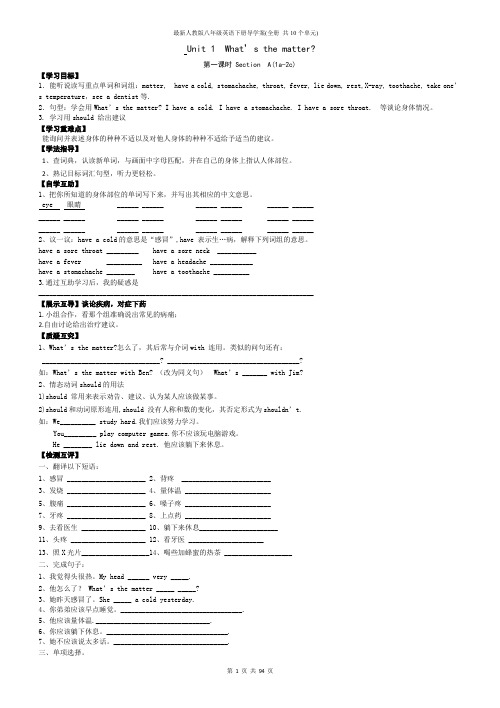
Unit 1 What’s the matter?第一课时 Section A(1a-2c)【学习目标】1.能听说读写重点单词和词组:matter, have a cold, stomachache, throat, fever, lie down, rest,X-ray, toothache, take one’s temperature,see a dentist等.2.句型:学会用What’s the matter? I have a cold. I have a stomachache. I have a sore throat. 等谈论身体情况。
3. 学习用should 给出建议【学习重难点】能询问并表述身体的种种不适以及对他人身体的种种不适给予适当的建议。
【学法指导】1、查词典,认读新单词,与画面中字母匹配,并在自己的身体上指认人体部位。
2、熟记目标词汇句型,听力更轻松。
【自学互助】1、把你所知道的身体部位的单词写下来,并写出其相应的中文意思。
eye 眼睛 ______ ______ ______ ______ ______ ____________ ______ ______ ______ ______ ______ ______ ____________ ______ ______ ______ ______ ______ ______ ______2、议一议:have a cold的意思是“感冒”,have 表示生…病,解释下列词组的意思。
have a sore throat _________ have a sore neck ___________have a fever __________ have a headache ____________have a stomachache ________ have a toothache __________3.通过互助学习后,我的疑惑是_____________________________________________________________________________【展示互导】谈论疾病,对症下药1.小组合作,看那个组准确说出常见的病痛;2.自由讨论给出治疗建议。
2020年春人教新目标英语八年级下册Unit-2全单元导学案(无答案)
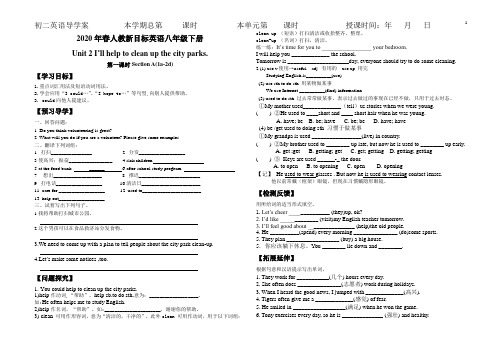
2020年春人教新目标英语八年级下册Unit 2 I’ll help to clean up the city parks.第一课时Section A(1a-2d)【学习目标】1.重点词汇用法及短语动词用法。
2.学会应用“I could…”、“I hope to…”等句型,向别人提供帮助。
3. could向他人提建议。
【预习导学】一、回答问题:1. Do you think volunteering is great?2. What will you do if you are a volunteer? Please give some examples.二、翻译下列词组:1. 打扫________________2. 分发__________________3.使高兴;振奋_________________4.sick children5.at the food bank ______6.after-school study program7.想出___________________ 8. 推迟________________________9. 打电话__________________ 10.清洁日_______________________11. care for __________________ 12. used to_______________________13. help out__________________三、试着写出下列句子。
1.我将帮助打扫城市公园。
2.这个男孩可以在食品救济站分发食物。
3.We need to come up with a plan to tell people about the city park clean-up.4.Let’s make some notices ,too.【问题探究】1. You could help to clean up the city parks.1)help作动词,“帮助”。
八年级英语下册unit2whatshouldido导学案

Unit 2 What should I do?Section A (1a-2c)预习案Ⅰ预习导学一、词汇精粹学习建议从课本1a-2c中找出下列单词、短语。
1. 播放2. 争吵;争论3. keep out4. 错误的5. style6.票;入场券7.使惊奇 8.could 9. out ofstyle10. call sb. up 11. 用电话交谈二、听力内容预测(一)牢记P10-P11出现的生词,扫清听力障碍。
(二)观察1a上面的图片和下面的句子,大胆预测:1. What’s the girl thinking in the picture on the top left corner(左上角)?2. What does another girl suggest(建议)to her?3. Should she argue with her parents?三、语法聚焦翻译下列句子。
1.“What’s wrong?”“My clothes are out of style.”2.“What should I do?”“You should say you’re sorry.”3.“What should he do?”“Maybe he should write her a letter.”看一看:1.找出例句1的问句同义句。
2.以上句子中是用哪个单词提建议的,哪一个副词使建议的语气更加委婉?3.将例句2的答语变为否定句。
Ⅱ预习自测一、词汇精粹1. We must have a to watch a movie.2. It’s rude to with others when you have different opinions.3. My son gave me some flowers on Mother’s Day. It really (使惊奇)me.4. The word means“not right”. It is “”5. When a coat is not fashionable,we call it .二、语法聚焦将下列对话搭配起来。
unit 2 my family导学案(6个课时,无答案)
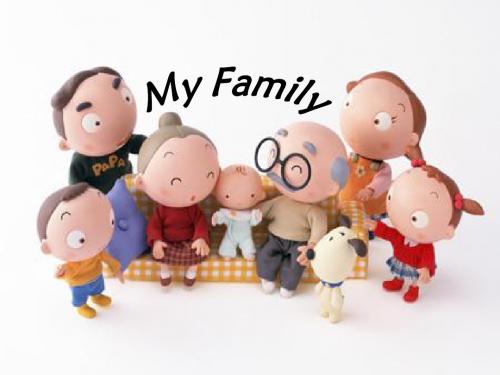
Purpose: Design an English
communication and activity of the introduction, stimulate the interest of the students from the experience of life.
Step 4. Practice
2.Ability aim:
To introduce their family members simply.
4
3.Emotional aim:
Pay more attention training students’ love for the family and the life.
Teaching important points and difficult points:
Step2:
• Grandfather
and grandmother
• Father and mother
• Brother
and sister
Step 3. Presentation
1. I will teach the students new sentence: Who is this girl/ boy? She/ He is …
Step 1. Warming up
Sing a song: Finger family. Purpose: It is important to
form a better surrounding for the students by singing and make the students have a cheerful state of mind to study English.
人教版八年级英语下册导学案(知识点+练习题带答案)

初二英语下册导学案(知识汇总+练习题)Unit 1单词matter [ˈmætə] v. 重要,要紧,有关系What’s the matter? 怎么了?出什么事了?sore [sɔ:(r)] adj. 疼痛的,酸痛的have a cold 感冒stomach ['stʌmək] n. 胃,腹部stomachache ['stʌməkeɪk] n. 胃痛,腹痛have a stomachache 胃痛foot(复数feet) [fu:t] n. 脚neck [nek] n. 颈,脖子throat [θrəʊt] n. 喉咙fever ['fi:və] n. 发烧,发热lie [laɪ] v. 躺,平躺lie down 躺下rest [rest] n. 剩余部分,其余;放松,休息cough [kɒf] n. & v. 咳嗽X-ray ['eksreɪ] n. X光,X射线toothache [ˈtu:θeɪk] n. 牙痛take one's temperature 量体温headache [ˈhedeɪk] n. 头痛have a fever 发烧break [breɪk] n. & v. 休息,暂停;打破take breaks (take a break)休息hurt [hə:t] v. 伤害,损害,使受伤,疼passenger ['pæsɪndʒə] n. 乘客,旅客off [ɒf] adv. prep. 离开(某处);从…去掉get off 下车to one's surprise 使…惊讶,出乎…意料onto [ˈɒntə] prep. 向,朝trouble [ˈtrʌbl] n. 麻烦,烦扰,问题hit [hit] n. & v. 碰撞,打,打击right away 立即,马上get into 陷入,参与herself [hə:ˈself]她自己,她本身(she的反身代词)bandage ['bændɪdʒ] n. & v. 绷带;用绷带包扎sick [sɪk] adj. 患病的,不适的knee [ni:] n. 膝盖nosebleed [ˈnəʊzbli:d] n. 鼻出血breathe [bri:ð] v. 呼吸sunburned [ˈsʌnbɜ:nd] adj. 晒伤的ourselves [ɑ:ˈselvz]我们自己(we的反身代词)climber [ˈklaɪmə(r)] n. 登山者be used to 习惯于… 适应于…risk [rɪsk] n. & v. 风险,危险;冒险take risks (take a risk) 冒险accident [ˈæksidənt] n. 意外事件;事故situation [ˌsitjuˈeiʃən] n. 状况,形式,情况kg=kilogram [ˈkɪləgræm] n. 公斤,千克rock [rɔk] n. 岩石run out (of) 用尽,耗尽knife [naif] n. 刀,餐刀cut off 切除blood [blʌd] n. 血mean [mi:n] v. 意味着,意思是,意欲get out of 离开,从… 出来importance [ɪmˈpɔ:tns] n. 重要性decision [dɪ'sɪʒn] n. 决心,决定,抉择control [kən'trəʊl] v. 控制,支配,操纵be in control of 掌管,管理spirit ['spɪrɪt] n. 勇气,意志death [deθ] n. 死亡give up 放弃nurse [nə:s] n. 护士Unit1 知识梳理【重点单词】matter [ˈmætə] v. 重要,要紧,有关系What’s the matter? 怎么了?出什么事了?sore [sɔ:(r)] adj. 疼痛的,酸痛的have a cold 感冒stomach ['stʌmək] n. 胃,腹部stomachache ['stʌməkeɪk] n. 胃痛,腹痛have a stomachache 胃痛foot(复数feet) [fu:t] n. 脚neck [nek] n. 颈,脖子throat [θrəʊt] n. 喉咙fever ['fi:və] n. 发烧,发热lie [laɪ] v. 躺,平躺lie down 躺下rest [rest] n. 剩余部分,其余;放松,休息cough [kɒf] n. & v. 咳嗽X-ray ['eksreɪ] n. X光,X射线toothache [ˈtu:θeɪk] n. 牙痛take one's temperature 量体温headache [ˈhedeɪk] n. 头痛have a fever 发烧break [breɪk] n. & v. 休息,暂停;打破take breaks (take a break)休息hurt [hə:t] v. 伤害,损害,使受伤passenger ['pæsɪndʒə] n. 乘客,旅客off [ɒf] adv. prep. 离开(某处);从…去掉get off 下车to one's surprise 使…惊讶,出乎…意料onto [ˈɒntə] prep. 向,朝trouble [ˈtrʌbl] n. 麻烦,烦扰,问题hit [hit] n. & v. 碰撞,打,打击right away 立即,马上get into 陷入,参与herself [hə:ˈself] pron. 她自己,她本身(she 的反身代词)bandage ['bændɪdʒ] n. & v. 绷带;用绷带包扎sick [sɪk] adj. 患病的,不适的knee [ni:] n. 膝盖nosebleed [ˈnəʊzbli:d] n. 鼻出血breathe [bri:ð] v. 呼吸sunburned [ˈsʌnbɜ:nd] adj. 晒伤的ourselves [ɑ:ˈselvz] pron. 我们自己(we的反身代词)climber [ˈklaɪmə(r)] n. 登山者be used to 习惯于… 适应于…risk [rɪsk] n. & v. 风险,危险;冒险take risks (take a risk) 冒险accident [ˈæksidənt] n. 意外事件;事故situation [ˌsitjuˈeiʃən] n. 状况,形式,情况kg=kilogram [ˈkɪləgræm] n. 公斤,千克rock [rɔk] n. 岩石run out (of) 用尽,耗尽knife [naif] n. 刀,餐刀cut off 切除blood [blʌd] n. 血mean [mi:n] v. 意味着,意思是,意欲get out of 离开,从… 出来importance [ɪmˈpɔ:tns] n. 重要性decision [dɪ'sɪʒn] n. 决心,决定,抉择control [kən'trəʊl] v. 控制,支配,操纵be in control of 掌管,管理spirit ['spɪrɪt] n. 勇气,意志death [deθ] n. 死亡give up 放弃nurse [nə:s] n. 护士【重点短语】1.have a fever 发烧2.have a cough 咳嗽3.have a toothache 牙疼4.talk too much 说得太多5.drink enough water 喝足够的水6.have a cold 受凉;感冒7.have a stomachache 胃疼8.have a sore back 背疼9.have a sore throat 喉咙痛10. take risks 冒险11.hot tea with honey 加蜂蜜的热茶12.see a dentist 看牙医13.get an X-ray 拍X 光片14.take one’ s temperature 量体温15.put some medicine on sth. 在……上面敷药16. give up 放弃17. sound like 听起来像18. all weekend 整个周末19. in the same way 以同样的方式20. go to a doctor 看医生21. go along 沿着……走22. on the side of the road 在马路边23. shout for help 大声呼救24. without thinking twice 没有多想25. get off 下车26. have a heart problem 有心脏病27. to one’ s surprise 另某人惊讶的是28. thanks to 多亏了;由于29. in time 及时30. make a decision 做出决定31. get into trouble 造成麻烦32. right away 立刻;马上33. because of 由于34. get out of 离开;从……出来35. keep on doing sth. 继续或坚持做某事36. put a bandage on sth. 用绷带包扎37. fall down 摔倒38. feel sick 感到恶心39. have a nosebleed 流鼻血40. cut his knee 割伤他的膝盖41. put her head back 把她的头向后仰42. have problems breathing 呼吸困难43. mountain climbing 登山运动44. be used to doing sth. 习惯做某事45. run out (of) 用完;用尽46. so that 以便47. so...that... 如此……以至于...…48. be in control of 掌管;管理49. in a difficult situation 在闲境中【重点句型】1. What's the matter with you?= What'the trouble with you?= What's wrong with you? 你怎么了?2. What should she do? 她该怎么办呢?3.Should I take my temperature? 我应该量一下体温吗?4.You should lie down and rest. 你应该躺下休息一会儿。
- 1、下载文档前请自行甄别文档内容的完整性,平台不提供额外的编辑、内容补充、找答案等附加服务。
- 2、"仅部分预览"的文档,不可在线预览部分如存在完整性等问题,可反馈申请退款(可完整预览的文档不适用该条件!)。
- 3、如文档侵犯您的权益,请联系客服反馈,我们会尽快为您处理(人工客服工作时间:9:00-18:30)。
Unit 2 I’ll help to clean up the city parks.导学案第1课时Section A 1a-1c【学习目标】1.重点词汇用法及短语动词用法。
2.学会应用“I could…”、“I hope to…”等句型,向别人提供帮助。
【重点、难点】重点词汇用法及短语动词用法。
一、【自主学习】㈠回答问题:1. Do you think volunteering is great?2. What will you do if you are a volunteer? Please give some examples.㈡翻译下列词组:1.打扫________2. 分发________________3.使高兴;振奋____________4.sick children5.at the food bank6.after-school study program二、【合作探究】㈠看课本1a, 看图片中你能帮助别人的方式。
然后列出其他方式,完成1a。
㈡听读说训练:1. 听一听,填一填,完成1b。
2. 朗读1b,勾画有用的表达法: clean up; cheer up; give out; at the foodbank3. 练习上面图片中的对话,然后使用1b中的信息编写对话,完成1c。
(三)语言学习1. You could help to clean up the city parks.1)help作动词,“帮助”。
help sb.to do sth.意为:___________________.如:He often helps me to study English.2)help作名词,“帮助”。
如:______________________. 谢谢你的帮助。
3) clean 可用作形容词,意为“清洁的,干净的”,此外clean 可用作动词,用于以下词组:clean up 打扫清洁或收拾整齐,整理。
clean out 打扫某物内部(如:房间,抽屉,箱子等)clean-up (名词)打扫,清洁。
练一练:It’s time for you to _________________ your bedroom.I will help you _____________ the school.Tomorrow is _____________________day, everyone should try to do somecleaning.2. sick和ill的用法区别sick是形容词,"生病的",同义词是ill。
区别在于sick在句中可做语和____ 语,而ill只能做语。
如:His father was /sick yesterday, so he didn't go to work.他的父亲昨天病了,因此他没有去上班。
Tom has looked after the sick girl for a week. 汤姆照顾那个生病的小女孩已经一星期了。
当ill意为"坏的,恶劣的"时,在句中可做定语。
如:He is an ill child.他是一个坏孩子。
三、【达标检测】用所给词的适当形式填空。
1. Let’s cheer _________ (they)up, ok?2. I’d like _____________ (visit)my English teacher tomorrow.3. I’ll feel good about _______ (help)the old people.4. He _____(spend) every morning _______ (do)some sports.5. They plan ___________ (buy) a big house.【情智培养】这节课我学会了__________________________________我的困惑是__________________________________第2课时Section A 2a-2d【学习目标】1.重点词汇用法及短语动词用法。
2.could向他人提建议, 动词短语的区别【重点、难点】could向他人提建议, 动词短语的区别,角色扮演一、【自主学习】(一)翻译下列词组:1.想出______________2.推迟_________________3.张贴__________________4.分发______________5.打电话________________6.清洁日________________7.care for ___________ ed to______________9.help out_____________(二)自读、小组内互读单词和词组。
二、【合作探究】(一)听读说训练:1.一群学生正在策划一个城市公园清洁日。
听录音,并勾出他们为告诉人们关于城市清洁日要做的事,完成2a。
2.朗读2b中的句子,再听一遍录音,并填空,完成2b。
3.用2a和2b中的信息编写对话,完成2c。
4.分角色表演对话,勾画出其中的重点短语,完成2d。
(二)语言学习。
1. We need to come up with a plan for the City Park Clean -up Day.我们需要为城市公园清洁日想出一个计划。
【解析】come up with =think up 想出【短语】:think about 考虑think of 想起think over 仔细考虑【谚语】Think before you act 三思而后行( ) ①We need______________(想出) a plan.( )②My mother came up with a good idea which we all agreed to.A.thought aboutB. thought upC. thought hard2. They told me stories about the past and how things used to be.他们给我讲过去的故事,并告诉我过去事情是什么样子的。
【解析】(1) use v.使用→useful adj. 有用的use up 用完Studying English is__________(use).(2) use sth to do sth 用某物做某事We use Internet __________(find) information.(3) used to do sth 过去常常做某事,表示过去做过的事现在已经不做,只用于过去时态。
①My mother used_________(tell)us story when we were young. ( )②He used to ____short and ____ short hair when he was young.A. have; beB. be; haveC. be; beD. have; have(4) be /get used to doing sth 习惯于做某事My grandpa is used ___________(live) in country.(5) be used to do sth 被用来做某事=be used for doing sth①Stamps is used ____________(post) letters.( )②My brother used to _____ up late, but now he is used to ___ up early.A. get ;getB. getting; getC. get; gettingD. getting;getting( )③Keys are used ___ the door.A. to openB. to openingC. openD. opening【记】He used to wear glasses . But now he is used to wearing contact lenses. 他以前常戴(框架)眼镜,但现在习惯戴隐形眼镜。
3.Yeah, a lot of old people are lonely. 是的,很多老年人都很孤独。
【解析】alone / lonely 辨析:(1)alone = by oneself adj. 单独的,指无人陪伴的客观事实,不带感情色彩。
He often walks alone to home .(2)lonely①指人孤独的,寂寞的,强调主观感受;②也可指某个地方是荒凉的( )①The old man lives ___,but he never feels ____.A. alone ;lonelyB. lonely; aloneC. alone; aloneD. lonely;lonely( )②My little sister is afraid to stay at home alone.A. quietlyB. lonelyC. all the timeD. by herself ( ) ③He did the work all by himself.A. alreadyB. togetherC. aloneD. lonely三、【达标检测】1.He has a lot of work to do, so he has to_______________going to the doctor.2.Could you help me _________________ these new books?3.Don’t worry. I’ll help ______________your room.4.Let’s _______________the sick kids in the hospital.5.In the end, Grandma ________________ a good idea.6.Would you please not _______________signs here?7.We’re going to ______________a food bank to help hungrypeople.8. I’ll ________you________ as soon as I come back. 【情智培养】这节课我学会了__________________________________我的困惑是__________________________________第3课时Section A 3a-3c【学习目标】1.重点词汇用法及短语动词用法。
